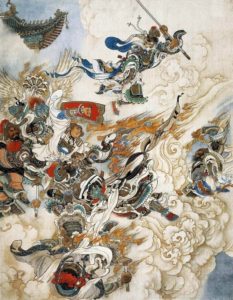孙悟空节
Festival of the Monkey King
_______________________________________________________

This festival occurs in the 8th lunar month, on the 16th day in the farmer’s calendar. The monkey King, Sun Wu Kong [孙悟空] is the main protagonist of a folklore legend, which has gained worldwide acclaim under the name of Journey to the West [西游记]. The plot consists of a Buddhist monk, Tang [唐僧] who travels West to procure Buddhist scriptures. Sun Wu Kong, armed with an As-You-Will Golden Cudgel [如意金箍棒] as the monk‘s main guardian fends off countless demons and monsters along the way. The birthday of Sun Wu Gong is celebrated in Singapore on the 15th and 16th day of the first lunar month. His birth is elucidated in the opening chapter of the Journey to the West:
正当顶上,有一块仙石。。。一日迸裂,产一石卵,似圆球样大。 因见风,化作一个石猴,五官俱备,四肢皆全。便就学爬学走,拜了四方。目运两道金光,射冲斗府。
Right at the summit, there was an immortal stone… One day it split open, producing a stone ovum, which resembled a round ball in size. When the wind blew against it, it was transformed into a stone monkey, which possessed all five sense organs and had all four limbs working. Then it learned how to crawl and walk, and paid obeisance to the four directions. Its eyes bore two rays of golden radiance, which beamed out and dashed up to the Big Dipper’s residence [in the Heavens].
His name literally means ‘Sun, [the One] awakened to Emptiness’., thus insinuating that the Journey to the West contains much deeper content such as numerous instructions for internal alchemy practices. Its original authorship is arguably attributed to none other than the founder of the Daoist Dragon Gate Sect, Qiu Chu Ji [丘处机].
There is another important scripture written by Liu Yi Ming [刘一明] to explain the hidden meaning within Journey to the West called Original Pointers to the Journey to the West [西游原指].
The Monkeys often is referred to as the heart-monkey [心猿]. Together with the horse-mind [意马], this is a core concept in Daoist spiritual cultivation practices, and represents the obstacles generated by one’sthoughtsand racing mind, often referred to as the monkey-mind in the West.
Another example is Monkey’s ability to leap 108,000 Chinese miles in one jump, which is 3 X 36,000, which at first seems to be a random number, but it implies that the monkey king at his level of cultivation is able to travel in all dimensions unrestrained and freely.
In the Daoist Morning and Evening Scripture it is stated:
天上三十六, 地下三十六。
There are thirty-six Heavens above
and there are thirty-six Earths below.
The last instance, despite originating from a movie adaptation of Journey to the West, called ‘[Sun Wu Kong] Hitting the White-Bone Goblin Three Times’ [三打白骨精], was watched by Li Shi Fu and he commented that it encompassed very profound teachings.
你火眼金睛看的是真相,而你师傅看的是心相。
Your fiery eyes and golden pupils see true images, what your master sees are the heart-mind images.
The fleshy eyes, i.e. the ordinary eyes, of the Tang monk see the physical images. But the eyes of the dharma [法眼] see the real images, through the disguises of shapeshifting.
Li Shi Fu furthermore illuminated that the heart-mind images are issues on the material level and on the level of one’s recognition. He the recited a sentence from the Scripture of Purity and Stillness [清静经]:
色即是空, 空即是色。
Form is empty; emptiness is form.
There is the heart-mind image, and the image of the dharma. The heart-mind’s image, if you are not pure like a child you cannot open the door. But we are so controlled from childhood on, by parents, schools and society. A story to underline this point is that of the emperor’s new clothes; everyone tries to appease him,”your sovereign’s clothes look so beautiful”. A new tailor on purpose decided to trick the emperor to make him see the dishonesty of people around him. In the end the emperor steps out naked without wearing any clothes at all, but the people do not want to embarrass him, thus tell him that he is wearing amazingly enthralling clothes.
Let us conclude with a final saying also appearing in Wu Cheng En’s [吴承恩] edition in the 2nd chapter:
这个却难!却难!祖师道:世上无难事,只怕有心人。
悟空闻得此言,叩头礼拜。
This is indeed difficult! Indeed difficult! The ancestral master instructed:
In this world, there are no difficult affairs, so long as there are people with a fixed determination.
Would you like to subscribe to our newsletter?
If you enjoyed reading this please consider supporting us!
When we started the Purple Cloud Institute, our aim was to make accessible educational material about traditional Chinese cultural practices. We strive to keep prices of our books as affordable as possible and the content we provide free of charge. However, there are many ongoing behind the scenes costs and the time taken to provide such content is considerable.
If you have enjoyed our offerings please consider donating and supporting us. The help will allow us to make time to bring you more in the way of book publications, podcasts and videos about tradition-based Daoist, Chinese medicine and martial arts and help keep these traditions alive.
Your assistance is greatly appreciated!
30th September 2020 /
